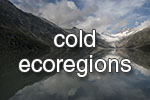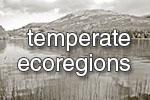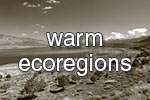Lakes in cold ecoregions - indicators for climate change
The raising temperatures and changes in precipitation patterns due to climate change will result in complex cause–effect chains, linked by many interacting environmental parameters. The degree of ecosystem response will depend on the ecoregion (cold, temperate or warm) and ecosystem type (lakes, rivers or wetlands), and on species-specific adaptations of different organisms.
The purpose of this section is to suggest indicators for the effects of climate change on lake, river and wetland ecosystems that reflect the direction of their pathways, relative importance, and magnitude of change.The term ‘indicator’ is used here simply to describe a detectable signal of a complex process that can be used as an early warning of ecosystem change. Indicators may be chemical, hydrological, morphological, biological or functional parameters, which reflect key processes influenced by climate change and are relatively simple to monitor.
The purpose of this section is to suggest indicators for the effects of climate change on lake, river and wetland ecosystems that reflect the direction of their pathways, relative importance, and magnitude of change. It addresses the three ecosystem types and the three climatic regions always with four categories of indicators: (a) abiotic variables; (b) primary producers; (c) macroinvertebrates; and (d) fish.









